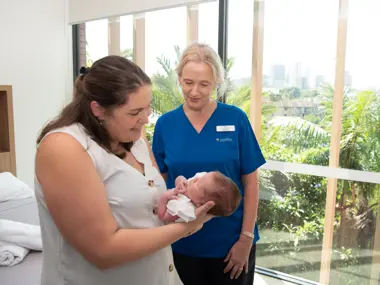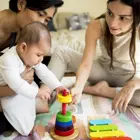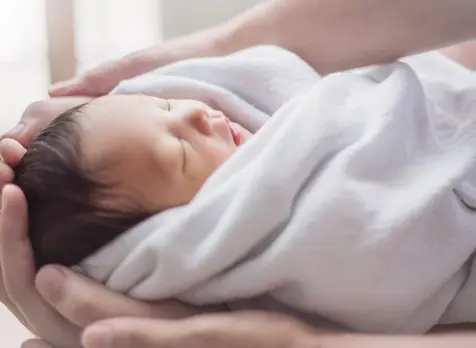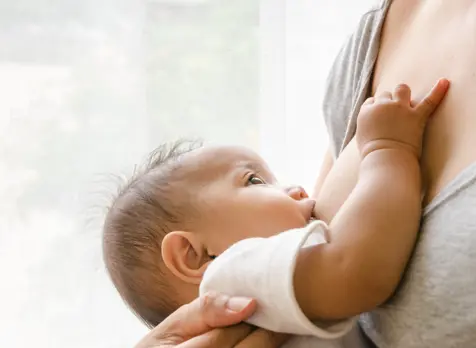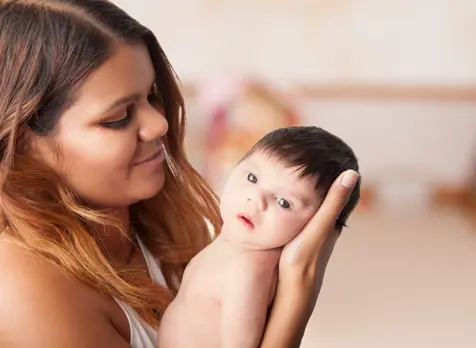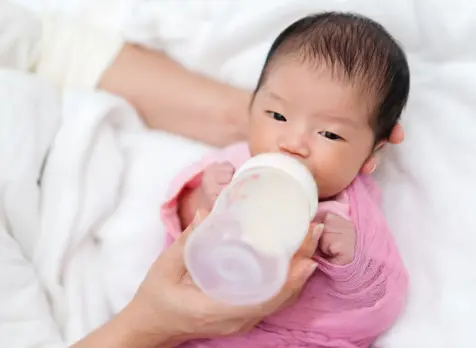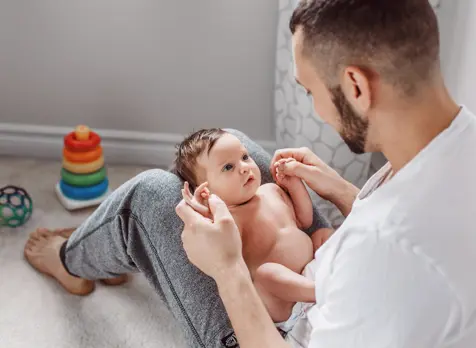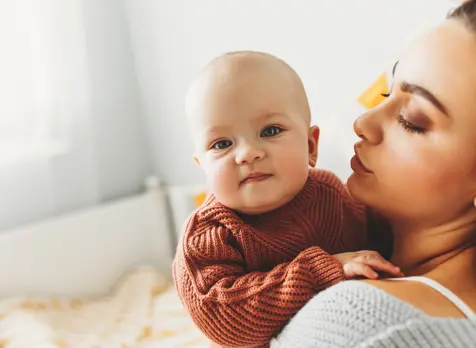Newborn Development

When your baby is first born, they have little to no understanding of the world or themselves. Instead, their experience and understanding is based on their senses and reflexes.
Your newborn baby's brain
From the moment of birth, your baby's brain embarks on a remarkable journey of growth and development. Their understanding of the world largely stems from their interactions with their caregivers. Here are ways you can support their brain development:
1. Establish a Safe Haven
During the first five years of life, your baby's brain undergoes rapid development. It thrives on being exposed to everyday experiences. Babies are incredibly adept learners, especially when they engage with those who love and care for them.
Be as present as possible during your baby's awake periods, responding with affection, cuddles, and attention. This fosters a sense of security and a reliable foundation. As a parent, one of your roles is to respond to your baby’s needs.
2. Stay in tune with your baby
As a caregiver, it's important to notice your baby's subtle facial expressions, body language, and emotions. This connection deepens your bond and helps you to decipher their cues.
For instance:
- When they grasp your finger and gaze into your eyes while feeding.
- The moment you receive their first recognisable smile.
- As they track your movements around the room with their eyes.
- During spirited conversations with you, marked by sounds and pauses that invite your response.
These cherished moments are the building blocks of your relationship with your baby.
3. Share stories and music
Research suggests that exposing your baby to stories, songs, and conversations from an early age can contribute to their brain development.
4. Help settle them to sleep
Minimise your baby's distress by helping them to settle to sleep in a gentle and responsive manner. Learn more about newborn sleep.
5. Establish a daily routine
Babies thrive when they have a consistent daily routine, as it makes their world more predictable. Newborn routines should be adaptable and sensitive to your baby's cues.
Newborn reflexes
-
1
Rooting reflex: When your baby is touched on either side of their mouth, they turn to the direction of the sensation and open their mouth, seeming to search for a breast or teat to begin feeding.
-
2
Sucking reflex: Once your baby has a nipple or teat in their mouth, they will begin to suck.
-
3
Startle or 'Moro' reflex: When your baby hears a loud sound, or notices a sudden movement, they startle. Their arms and legs splay out, they may cry and then their arms and legs withdraw towards their body in a flexed position. One reason we wrap little babies to help them sleep is to reduce the impact of the startle reflex if they are awoken.
-
4
Grasp reflex: When you touch the palm of your baby's hand, they will grasp your finger with their hand and fingers.
-
5
Tonic neck reflex: When your baby's head is turned to one side, the arm on the same side as their face stretches out, and the other arm bends at the elbow, up towards their head.
-
6
Step, or 'walking' reflex: When you hold your baby upright with their feet touching a surface, they will begin to step with one food, then the other, in turn.
Newborn developmental stages
Here are some week by week newborn development stages you might be able to expect. All children are different and develop at their own pace.
0 - 4 week old development
For the first month after birth, your baby mainly experiences learning via their physical movements and primary senses - touch, taste, smell, hearing and sight. Responses to their environment that are relatively reflexive.
Right from birth, your baby can see you but is still learning to focus and fix on objects. Initially, their vision isn't very sharp but this develops rapidly achieving adult 20/20 vision by four to six months of age.
Their hearing structures are already fully developed at birth and will develop further. The ability to hear from birth is important for language to develop which is why babies are screened in the first few weeks for hearing difficulties.
At birth:
- Have no or minimal head control
- When held in as sitting position, their back is curved and their head will fall forward
- Will close their eyes to sudden light
- May focus on a slowly moving object 22 to 30cm a way in a range of 45 degrees
- Will gaze at a face or object within 22 to 30cm
Typical developmental milestones by 1 month
- When lying on their back, keeps head to one side
- Hands are predominantly closed
- Moves arms and legs in large jerky movements
- Gaze caught and held by abright dangling object gently moved in their line of vision
- Gazes at an object that is slowly moved towards and away from their face
- Turns to a diffuse lights source, e.g. a lamp
5 - 8 week old development
As your baby begins to gain more control over and coordination of her body (from one month to four months of age), they are still primarily reflexive but begin to show some signs of early simple physical coordination.
In addition to these reflexes, babies have general body movements that occur spontaneously. These become more complex as your baby develops, and involve their whole body including the neck, trunk, arms and legs.
By 6 to 8 weeks, most babies have greater control over how their limbs move. Your baby's arms and leg movements will become smoother, and their newborn reflexes are much less evidence. They are beginning to turn their head and put their fingers and fists into their mouth.
When lying on their back, your baby is in less of a flexed position, with their arms and legs more spread out. When you use their arms to pull them into a sitting position, they can maintain their head and neck control for a brief minute or two. During tummy time they can raise their head, neck and some of their chest and turn it to the side.
Typical developmental milestones by 2 months
By two months old, most babies are:
- Beginning to smile
- Looking at you, paying close attention to your face
- Cooing and gurgling when they try to 'talk' to you
- “Turn taking” during conversations
- Turning their head to noises
- Bringing their hands to their mouths
- Looking and following objects as they move in front of them
- Crying or fussing to communicate the need for a change
- Holding up their head, neck and chest when on their tummy, beginning to 'push up'
- Making smoother, less random leg and arm movements.
Talk to your Child and Family Health nurse or GP if:
- Your baby doesn't seem to respond to loud sounds
- Your baby doesn't watch and follow objects as they move
- Your baby isn't smiling yet
- Your baby doesn't bring her hands to her mouth
- Your baby can't hold their head up when on their tummy
9 - 12 week old development
As your baby grows, they will start to recognise the connection between voices and faces, particularly yours. They will follow you with their eyes and may attempt to reach for objects or your face.
They will express emotions like interest, disgust and enjoyment. Their hand-eye coordination will be developing and they may attempt to support themselves on their legs.
Typical developmental milestones by 3 months
- Has good head control
- Hands loosely open
- Needs shoulder supported when being bathed or dressed
- Lying on their front, they can lift head and front portion of their chest to a 90 degree angle, taking their weight on the forearms
- Can start to sit for short periods of time in a well-supported sitting position
- Waves arms symmetrically
- Shows a desire to grasp an object
- If a rattle is placed in their hand, baby will actively hold onto it
- Grasp is no longer a reflex, it is now a voluntary action
Newborn weight development
Babies vary a lot in how they grow, which can be a great concern for parents. It is important not to compare your baby's growth to that of others you know. Many factors influence newborn growth. It's more useful to monitor your own baby's growth over time and to get advice from a Child and Family Health professional if you have any concerns.
Newborn babies have some additional fluid at birth which is lost in the first week or so after birth, while your baby is working out how to feed. Most babies will lose approximately 5 - 10% of their birthweight initially then regain their birthweight by about two to three weeks old. On average, most babies will gain approximately 150 - 200g per week in the first weeks but this can vary.
At your baby's regular health checks, your Child and Family nurse or GP will weigh your baby. They will also monitor your baby's length and head circumference as these are also important indicators of growth.




































